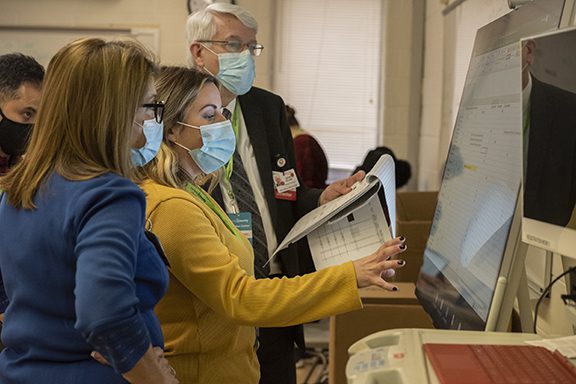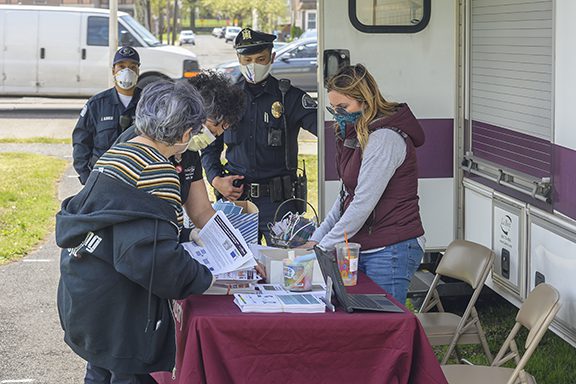The Women who Led Camden County’s Covid Response
Before Covid hit, Rachel Honrychs never thought a network of mask-making knitters would someday play a vital role in protecting the lives of Camden County residents. The director of the county’s Division of Environmental Health and Administrative Services, Honrychs had taken part in countless emergency-response drills meant to prepare health workers for a global pandemic. Yet none of those exercises involved planning pop-up parades and enlisting local influencers – including popular high school basketball players – to talk up vaccines.
But she and her health department colleagues realized early on that the pandemic playbook they had studied would be of little use. Simply put, there was no precedent for the measures needed to protect the lives and wellbeing of some half million county residents over the past 2 years.
“With the drills, you always had lots more time to think about how to respond,” Honrychs says. “The reality was more like jumping onto a speeding train with no way of getting off. We had to move at a pace that people weren’t used to, making the best decisions we could with the information we had at the time.”


Honrychs is among a handful of administrators in the predominantly female-led health department who were tasked with setting up and administering the county’s pandemic response plan. The unprecedented operation – involving close partnerships with law enforcement, municipal governments, nonprofits and local hospitals, including Cooper University Health Care, Virtua and Jefferson Health – New Jersey – was nothing short of game changing, says Camden County Board of Commissioners Director Louis Cappelli Jr.
“The moment Covid-19 became a clear and present threat in Camden County, the women in our health department stepped up to the plate and guided us through the most uncertain of times,” says Cappelli. “From working tirelessly to educate our residents on the best ways to stay safe and healthy to setting up vaccine and testing clinics and beyond, this pandemic could have played out very differently if we didn’t have the incredible, committed women of the Camden County Health Department leading the way.”
Among those leaders, Caryelle Lasher, the county’s lead epidemiologist, considers the county’s pandemic response something like a 2-part series: There was the time before vaccines became available and the time after.
“The first part – before vaccines – was much more difficult,” says Lasher. “We were dealing with a lot more unknowns and fear.”
Among her highest priorities back then was setting up the county’s contact tracing system, which notified residents of potential Covid exposures and kept track of them. It was an all-hands-on-deck operation.
“We trained more than 200 people to handle some really difficult conversations, including interviews with mothers who had just lost a child and children who had to bury their parents,” she says. “We had to ask very pointed questions about exposure while providing support and compassion for them.”
Both data collection and conversations were critical to helping Lasher figure out the most effective ways to protect people. It helped her team pinpoint where testing sites would matter most and other ways of containing the spread of the virus through education and delivering PPE where it was needed.
“We had one of the most effective programs in the state for finding safe places for Covid-positive people to isolate,” she says. “We created an entirely electronic intake system connecting people with social workers to identify their medical and social needs – everything from whether they needed medications for chronic diseases, clean clothing and food to what kinds of books they liked. Then we had volunteers help pull together materials, including books, clothing and food.”
Lasher says the approval of vaccines brought new energy to workers on the brink of exhaustion but also new challenges, such as convincing people the vaccines were safe and figuring out the best strategies for getting shots into arms. While the opening of a mega-site at Camden County College led the way to mass vaccination, the county also worked with businesses, municipal workers, clergy, schools and non-profit organizations to help in the vaccination effort.
As the work has been winding down, Lasher says the health department is applying the lessons learned from its Covid response to nearly everything it does. She expects that the relationships and respect formed across different entities as a result of working so closely together during the crisis will lead to better health outcomes of residents moving forward.
“We all understand that health isn’t just the medical part,” she says, “and we’re working together, asking the difficult questions to make sure people feel safe in their homes, have access to food or if they need other help. That’s what has come out of this.”

Camden County Health Department employees reflect on the Covid response
Maureen Bergeron
Director Senior Services
The pandemic taught me how to become a better leader. There was no time to ask permission. I jumped on calls and listened to how other counties and states were handling the pandemic. The most important lesson was to attentively listen to the concerns and fears of others. I immediately started a list of our frail seniors and had staff, who were working from home, make daily wellness checks. With that we addressed the concerns of our senior and disabled population.
Rachel Honrychs
Director Environmental Health and Administrative Services
Working with my teams so closely, I have built a bond and trust level that would not have occurred without this pandemic. This trust allowed me to delegate responsibilities and depend on my team. As someone who had a need to control situations, delegating was a hard task. This pandemic did not give me that option. I needed my team. I have become a more effective leader because of it.
Claudia Whitcraft, RN, MSN
Director of Nursing
There was no time to reflect in the midst of it, we had a job to do and that was the focus. As it ended, I realized how easily we take life for granted. I remember the first holiday of not being able to have dinner with my family. It was Easter and it was a beautiful day so we met in my brother’s backyard just to catch a glimpse of each other. Professionally, my co-workers became like family. Now that it’s over and we are all back to our regular jobs, it’s actually exciting to see them in the hallway. There is a bond there that will never be broken.
Marie Meade
Administrative Assistant
I am grateful to have been a part of something that was bigger than me. When I was 5 years old, I can remember waiting in line to get my polio vaccine (dispensed in a sugar cube) which was quick and easy. I wanted to do my part to help the community feel that we cared, and we were doing all we could in the best way to keep them safe.
Anne Walters
Former Department Director
From an initial lack of PPE and test kits to a lack of sufficient vaccine to performing homebound vaccinations, my coworkers and I just kept pushing our way through and succeeding! Literally nothing was impossible as we continued to fight Covid and will continue to deal with Covid in the future. As trite as it may sound, nothing is impossible – start doing a seemingly impossible task and with hard work and resolve, it will be successfully accomplished.
Caryelle Lasher
Department Director
Every day I spoke with residents that were ill or just lost a loved one, and healthcare professionals afraid to hug their children, working around the clock to save lives. They shared their gratitude, fear, grief, and compassion. I was humbled by the stories of community heroes and by the tragedy so many endured. It made me grateful for my health, my family, and everyone I work with.
Koren Norwood
Director of Health Education
It was clear that health education and information was essential to how we navigated this pandemic. Working during the pandemic, I saw that health education specialists were thrust to the frontlines to engage the public and deliver current information, interpret information, act as a resource for social services, help calm fears, and give instruction on what to do. Health educators are more important than ever to support the health and wellbeing of people in our communities, of which I am committed.

